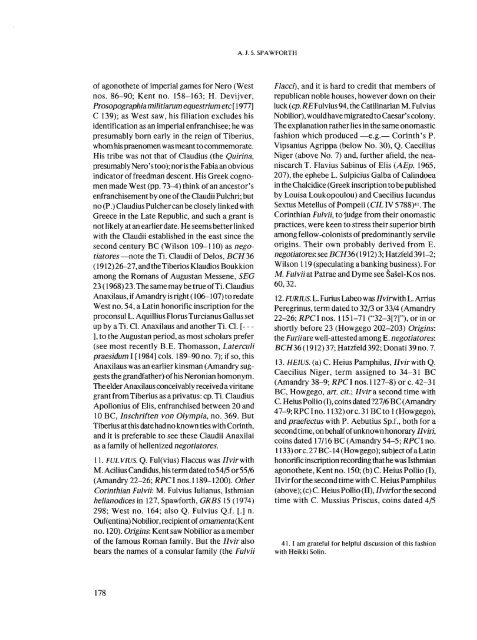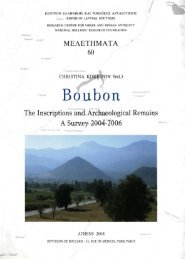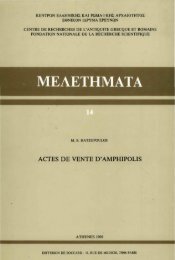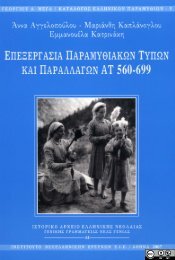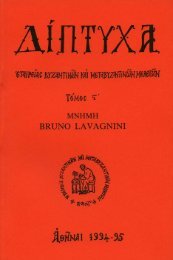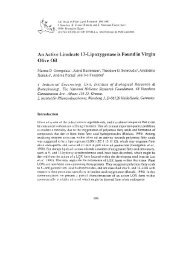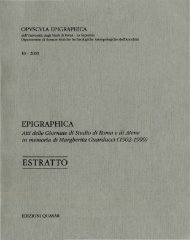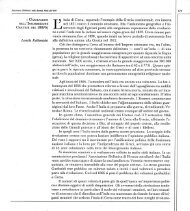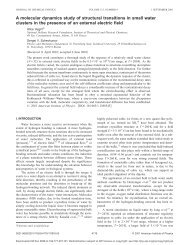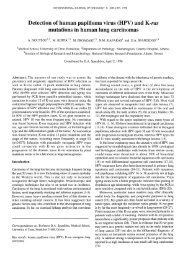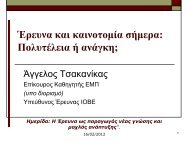Roman onomastics in the Greek East: social and political aspects ...
Roman onomastics in the Greek East: social and political aspects ...
Roman onomastics in the Greek East: social and political aspects ...
You also want an ePaper? Increase the reach of your titles
YUMPU automatically turns print PDFs into web optimized ePapers that Google loves.
of agono<strong>the</strong>te of imperial games for Nero (West<br />
nos. 86-90; Kent no. 158-163; H. Devijver,<br />
Prosopographia militiarum equestrium etc [ 1977]<br />
C 139); as West saw, his filiation excludes his<br />
identification as an imperial enfranchisee; he was<br />
presumably born early <strong>in</strong> <strong>the</strong> reign of Tiberius,<br />
whom his praenomen was meant to commemorate.<br />
His tribe was not that of Claudius (<strong>the</strong> Quir<strong>in</strong>a,<br />
presumably Nero's too); nor is <strong>the</strong> Fabia an obvious<br />
<strong>in</strong>dicator of freedman descent. His <strong>Greek</strong> cognomen<br />
made West (pp. 73-4) th<strong>in</strong>k of an ancestor's<br />
enfranchisement by one of <strong>the</strong> Claudii Pulchri; but<br />
no (P.) Claudius Pulcher can be closely l<strong>in</strong>ked with<br />
Greece <strong>in</strong> <strong>the</strong> Late Republic, <strong>and</strong> such a grant is<br />
not likely at an earlier date. He seems better l<strong>in</strong>ked<br />
with <strong>the</strong> Claudii established <strong>in</strong> <strong>the</strong> east s<strong>in</strong>ce <strong>the</strong><br />
second century BC (Wilson 109-110) as negotiators—note<br />
<strong>the</strong> Ti. Claudii of Delos, BCH 36<br />
( 1912) 26-27, <strong>and</strong><strong>the</strong>Tiberios Klaudios Boukkion<br />
among <strong>the</strong> <strong>Roman</strong>s of Augustan Messene, SEG<br />
23 ( 1968) 23. The same may be true of Ti. Claudius<br />
Anaxilaus, if Am<strong>and</strong>ry isright ( 106-107) to redate<br />
West no. 54, a Lat<strong>in</strong> honorific <strong>in</strong>scription for <strong>the</strong><br />
proconsul L. Aquillius Florus Turcianus Gallus set<br />
up by a Ti. Cl. Anaxilaus <strong>and</strong> ano<strong>the</strong>r Ti. Cl. [—<br />
], to <strong>the</strong> Augustan period, as most scholars prefer<br />
(see most recently B.E. Thomasson, Laterculi<br />
praesidum I [1984] cols. 189-90 no. 7); if so, this<br />
Anaxilaus was an earlier k<strong>in</strong>sman (Am<strong>and</strong>ry suggests<br />
<strong>the</strong> gr<strong>and</strong>fa<strong>the</strong>r) of his Neronian homonym.<br />
The elder Anaxilaus conceivably received a v<strong>in</strong>tane<br />
grant from Tiberius as a privatus: cp. Ti. Claudius<br />
Apollonius of Elis, enfranchised between 20 <strong>and</strong><br />
10 BC, Inschriften von Olympia, no. 369. But<br />
Tiberius at this date had no known ties with Cor<strong>in</strong>th,<br />
<strong>and</strong> it is preferable to see <strong>the</strong>se Claudii Anaxilai<br />
as a family of hellenized negotiatores.<br />
11. FULVIUS. Q. Ful(vius) Flaccus was J/Wrwith<br />
M. Acilius C<strong>and</strong>idus, his term dated to 54/5 or 55/6<br />
(Am<strong>and</strong>ry 22-26; RPCl nos. 1189-1200). O<strong>the</strong>r<br />
Cor<strong>in</strong>thian Fulvii: M. Fulvius Iulianus, Isthmian<br />
hellanodices <strong>in</strong> 127, Spawforth, GRBS 15 (1974)<br />
298; West no. 164; also Q. Fulvius Q.f. [.] n.<br />
Ouf (ent<strong>in</strong>a) Nobilior, recipient of ornamenta (Kent<br />
no. 120). Orig<strong>in</strong>s: Kent saw Nobilior as a member<br />
of <strong>the</strong> famous <strong>Roman</strong> family. But <strong>the</strong> J/v/'r also<br />
bears <strong>the</strong> names of a consular family (<strong>the</strong> Fulvii<br />
178<br />
A. J. S. SPAWFORTH<br />
Flacci), <strong>and</strong> it is hard to credit that members of<br />
republican noble houses, however down on <strong>the</strong>ir<br />
luck (cp. #£Fulvius 94, <strong>the</strong> Catil<strong>in</strong>arian M. Fulvius<br />
Nobilior), wouldhave migrated to Caesar's colony.<br />
The explanation ra<strong>the</strong>r lies <strong>in</strong> <strong>the</strong> same onomastic<br />
fashion which produced —e.g.— Cor<strong>in</strong>th's P.<br />
Vipsanius Agrippa (below No. 30), Q. Caecilius<br />
Niger (above No. 7) <strong>and</strong>, fur<strong>the</strong>r afield, <strong>the</strong> neaniscarch<br />
T. Flavius Sab<strong>in</strong>us of Elis (AEp. 1965,<br />
207), <strong>the</strong> ephebe L. Sulpicius Galba of Cal<strong>in</strong>doea<br />
<strong>in</strong> <strong>the</strong> Chalcidice (<strong>Greek</strong> <strong>in</strong>scription to be published<br />
by Louisa Loukopoulou) <strong>and</strong> Caecilius Iucundus<br />
Sextus Metellus of Pompeii (CIL IV 5788)4'. The<br />
Cor<strong>in</strong>thian Fulvii, to judge from <strong>the</strong>ir onomastic<br />
practices, were keen to stress <strong>the</strong>ir superior birth<br />
among fellow-colonists of predom<strong>in</strong>antly servile<br />
orig<strong>in</strong>s. Their own probably derived from E.<br />
negotiatores: see BCH36 (1912)3; Hatzfeld 391-2;<br />
Wilson 119 (speculat<strong>in</strong>g a bank<strong>in</strong>g bus<strong>in</strong>ess). For<br />
M. Fulvii at Patrae <strong>and</strong> Dyme see Sasel-Kos nos.<br />
60,32.<br />
12. FURIUS. L. Furius Labeo was JJWrwith L. Arrius<br />
Peregr<strong>in</strong>us, term dated to 32/3 or 33/4 (Am<strong>and</strong>ry<br />
22-26; RPCl nos. 1151-71 ("32-3[?]"), or <strong>in</strong> or<br />
shortly before 23 (Howgego 202-203) Orig<strong>in</strong>s:<br />
<strong>the</strong> Furiiare well-attested among E. negotiatores:<br />
BCH36 (1912) 37; Hatzfeld392; Donati 39no. 7.<br />
13. HEWS, (a) C. Heius Pamphilus, Ilvirmth Q.<br />
Caecilius Niger, term assigned to 34-31 BC<br />
(Am<strong>and</strong>ry 38-9; RPCl nos. 1127-8) or c. 42-31<br />
BC, Howgego, art. cit.; Ilvira second time with<br />
C. Heius Pollio (I), co<strong>in</strong>s dated ?27/6 BC (Am<strong>and</strong>ry<br />
47-9; RPCI no. 1132) or c. 31 BC to 1 (Howgego),<br />
<strong>and</strong> praefectus with P. Aebutius Sp.f., both for a<br />
second time, on behalf of unknown honorary Ilviri,<br />
co<strong>in</strong>s dated 17/16 BC (Am<strong>and</strong>ry 54-5; RPCl no.<br />
1133) or c. 27 BC-14 (Howgego); subject of a Lat<strong>in</strong><br />
honorific <strong>in</strong>scription record<strong>in</strong>g that he was Isthmian<br />
agono<strong>the</strong>te, Kent no. 150; (b) C. Heius Pollio (I),<br />
IIvir for <strong>the</strong> second time with C. Heius Pamphilus<br />
(above); (c) C. Heius Pollio (II), Hvirfor <strong>the</strong> second<br />
time with C. Mussius Priscus, co<strong>in</strong>s dated 4/5<br />
41.1 am grateful for helpful discussion of this fashion<br />
with Heikki Sol<strong>in</strong>.


